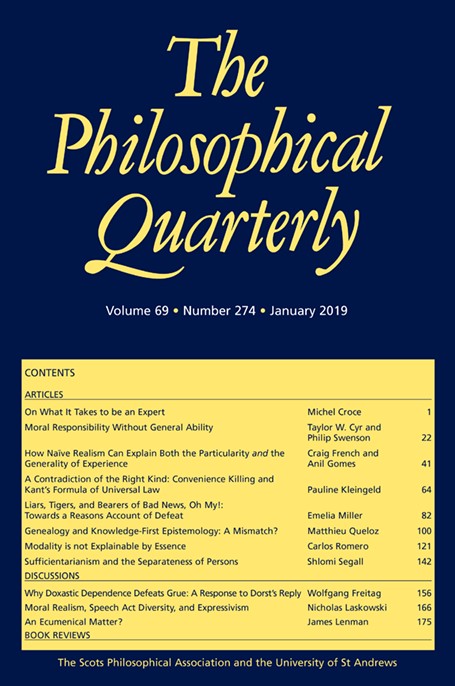-
Views
-
Cite
Cite
Caleb Cohoe, Aristotle, De Anima: Translation, Introduction, and Commentary, The Philosophical Quarterly, Volume 69, Issue 274, January 2019, Pages 192–193, https://doi.org/10.1093/pq/pqy001
Close - Share Icon Share
Extract
This translation and commentary by Christopher Shields is an impressive achievement. To begin with, it renders Aristotle into English more accurately and precisely than the previous Clarendon translation, done by D. W. Hamlyn. Shields does a good job of making Aristotle's reasoning clear while still being faithful to Aristotle's terminology, with a few exceptions to be discussed below.
Secondly, the introduction provides an excellent entry into Aristotle's views on the soul. Shields clearly presents the central topics of Aristotelian psychology and lays out the structure of the work. He helpfully presents the roles matter and form play in Aristotle's hylomorphism while also drawing attention to the philosophical issues about defining soul and body that Aristotle's framework raises and the complexities involved in applying this model to various living activities. Shields rightly notes that we should not think of the soul as ‘a set of capacities’ (an influential reading advocated by Jonathan Barnes and Richard Sorabji, inter alios) because the soul is neither a set nor ‘an aggregative entity at all’ (p. xxix). Shields recognizes the importance of the soul's unity for Aristotle and suggests that its powers are hierarchically ordered for teleological reasons: if a living thing is perceptive, for example, it is necessary that it also have a nutritive soul—otherwise it would not be able to secure its ends as the perceptual being it is, and nature would have acted in vain in equipping it (p. 184). Shields is right to point to the central role that teleology plays in Aristotle's views on the unity of living things, but more discussion of the underlying metaphysics would have been helpful (e.g. does Aristotle think that there are metaphysical connections between the various powers of the soul that result in a unified soul or is the connection merely teleological?). Also, while Shields does a good job of laying out Aristotle's explanatory framework, his introduction does not fully address the controversial question of where the science of the soul fits within Aristotle's view of reality: Is it simply part of the science of nature or does it also involve first philosophy, insofar as it includes reason, which grasps being itself?





